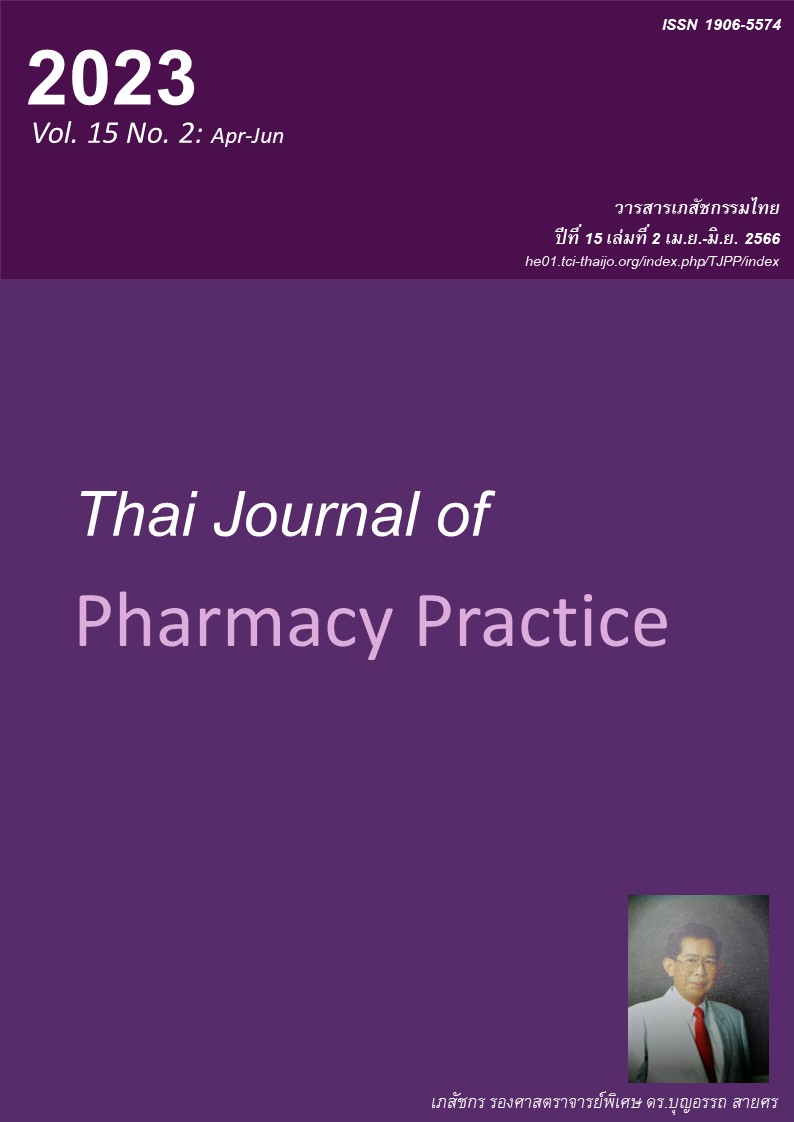ผลของการหยุดยา trihexyphenidyl ต่อการรับรู้ คุณภาพชีวิต และอาการทางจิต ในผู้ป่วยจิตเภท: การวิจัยทางคลินิกแบบสุ่มและมีกลุ่มควบคุม
Main Article Content
บทคัดย่อ
วัตถุประสงค์: เพื่อศึกษาผลของการหยุดยา trihexyphenidyl ต่อการรับรู้ คุณภาพชีวิต และอาการทางจิตของผู้ป่วยจิตเภท วิธีการ: รูปแบบของการศึกษานี้เป็นการวิจัยทางคลินิกแบบสุ่มและมีกลุ่มควบคุมที่เปรียบเทียบระหว่างกลุ่มผู้ป่วยจิตเภทที่หยุดยา trihexyphenidyl โดยลดขนาดยาลงร้อยละ 25 ต่อเดือน (กลุ่มทดลอง) และกลุ่มที่ไม่ได้หยุดยา (กลุ่มควบคุม) ณ โรงพยาบาลหนองสองห้อง การวัดผลใช้เครื่องมือ 4 ประเภท ได้แก่ 1) แบบประเมินการรับรู้ Montreal Cognitive Assessment (MoCA) ฉบับภาษาไทย 2) แบบประเมินคุณภาพชีวิตขององค์การอนามัยโลกชุดย่อฉบับภาษาไทย 3) แบบประเมินอาการทางจิต Brief Psychiatric Rating Scale และ 4) แบบประเมินการเกิดอาการเคลื่อนไหวผิดปกติ Modified Simpson Angus Scale การศึกษาติดตามผู้ป่วยเป็นระยะเวลา 20 สัปดาห์ ผลการศึกษา: กลุ่มตัวอย่าง 34 ราย แบ่งเป็นกลุ่มทดลอง 16 รายและกลุ่มควบคุม 18 ราย ซึ่งได้รับยา trihexyphenidyl ในขนาดเฉลี่ย 4.13 ± 3.56 มก./วัน และ 5.50 ± 3.85 มก./วัน ตามลำดับ (P>0.05) ผู้ป่วยส่วนใหญ่ได้รับยารักษาอาการทางจิตชนิดดั้งเดิม หลังจากสิ้นสุดการศึกษาสัปดาห์ที่ 20 พบว่า กลุ่มทดลองมีการรับรู้เพิ่มขึ้นเฉลี่ย 2.63 คะแนน [95%CI 1.46,3.80] อย่างมีนัยสำคัญทางสถิติ คุณภาพชีวิตในด้านความสัมพันธ์ทางสังคมในกลุ่มทดลองเพิ่มขึ้นมากกว่ากลุ่มควบคุมในสัปดาห์ที่ 20 (12.06 ± 2.17 และ 9.72 ± 2.61, ตามลำดับ; P=0.008) สำหรับอาการทางจิตของทั้งสองกลุ่มนั้นพบว่า คะแนนรวมมีค่าลดลงอย่างมีนัยสำคัญทางสถิติ โดยในกลุ่มทดลองลดลงจาก 26.06 ± 9.71 เป็น 19.56 ± 2.61 คะแนน (P=0.003) การเกิดอาการเคลื่อนไหวผิดปกติระหว่างกลุ่มพบว่ามีความแตกต่างกันอย่างไม่มีนัยสำคัญทางสถิติ (P>0.05) สรุปผล: การหยุดยา trihexyphenidyl ทำให้การรับรู้ คุณภาพชีวิตในด้านความสัมพันธ์ทางสังคมและอาการทางจิตของผู้ป่วยดีขึ้น ผู้ป่วยที่หยุดยามีความปลอดภัย และพบอาการเคลื่อนไหวผิดปกติได้น้อย
Article Details

อนุญาตภายใต้เงื่อนไข Creative Commons Attribution-NonCommercial-NoDerivatives 4.0 International License.
ผลการวิจัยและความคิดเห็นที่ปรากฏในบทความถือเป็นความคิดเห็นและอยู่ในความรับผิดชอบของผู้นิพนธ์ มิใช่ความเห็นหรือความรับผิดชอบของกองบรรณาธิการ หรือคณะเภสัชศาสตร์ มหาวิทยาลัยสงขลานครินทร์ ทั้งนี้ไม่รวมความผิดพลาดอันเกิดจากการพิมพ์ บทความที่ได้รับการเผยแพร่โดยวารสารเภสัชกรรมไทยถือเป็นสิทธิ์ของวารสารฯ
เอกสารอ้างอิง
Lotrakul M, Sukanich P. Ramathibodi psychiatry. 6th ed. Bangkok: Swicharn Publishing; 2001.
Department of Mental Health. Report of patients receiving psychiatric service [online]. 2022 [cited Jul 5, 2021]. Available from: www.dmh.go.th/report/data center/map/reds.asp
Woon PS, Chia MY, Chan WY, Sim K. Neurocog- nitive, clinical and functional correlates of subjective quality of life in Asian outpatients with schizophrenia. Prog Neuropsychopharmacol Biol Psychiatry 2010; 34:463-8.
Department of Mental Health. Manual of schizophre- nia care for hospitals in regional health nurse and public health technical officer. 2nd ed. Nonthaburi: Victoria Image Publishing; 2017.
Sae-ui C. Evaluation of trihexyphenidyl use in Schizo phrenia patients at Suansaranrom hospital [master thesis]. Songkhla: Prince of Songkla University; 2012.
Desmarais JE , Beauclair L, Margolese HC. Anticho- linergics in the era of atypical antipsychotics: short-term or long-term treatment? J Psychopharma- col 2012; 26: 1167-74.
Saran AS, Use or abuse of antiparkinsonian drugs by psychiatric patient. J Clin Psychiatry 1986; 47: 130-2.
World Health Organization. Prophylactic use of anti- cholinergic in patients on long-term neuroleptic treatment. Br J Psychiatry. 1990; 156: 412.
Santimaleeworagul W. Effects of trihexyphenidyl doses on cognitive function and quality of life in out-patients with schizophrenia: a cross-sectional study [master thesis]. Nakhon Pathom: Silapakorn University; 2004.
Lieberman JA. Managing anticholinergic side effects. Prim Care Companion J Clin Psychiatry 2004; 6: 20–3.
Desmarais JE, Beauclair L, Annable L, Bélanger M-C, Kolivakis TT, Margolese HC. Effects of discon- tinuing anticholinergic treatment on movement disorders, cognition and psychopathology in patients with schizophrenia. Ther Adv Psychopharmacol 2014; 4: 257–67.
Ogino S, Miyamoto S, Tenjin T, Kitajima R, Ojima K, Miyake N, et al. Effects of discontinuation of long-term biperiden use on cognitive function and quality of life in schizophrenia. Prog Neuropsychopharmacol Biol Psychiatry. 2011; 35: 78–83.
Sathienluckana T, Unaharassamee W, Suthisisang C, Suanchang O, Suansanae T. Anticholinergic discontinuation and cognitive functions in patients with schizophrenia: a pharmacist-physician collabo- ration in the outpatient department. Integr Pharm Res Pract 2018; 7: 161–71.
Tangwongchai S, Phanasathit M, Charernboon T, et al. The Validity of Thai version of the Montreal Cognitive Assessment (MoCA-T). Poster presented at: International Psychogeriatric Association 14th International Congress; 2009 Sep 1-5; Montreal Canada.
Mahatnirunkul S, Tuntipivatanaskul W, Pumpisan chai W, et al. Comparison of the WHOQOL100 and the WHOQOL-BREF (26 items). Journal of Mental Health of Thailand 1998; 5: 4-15.
Department of Mental Health. Manual for the care of schizophrenia patient at serious mental Illness with high risk to violence for institutions/hospitals under Department of Mental Health. Nonthaburi: Prosperous Plus Publishing; 2020.
Hattasin K, Kaewvichit S, Niwatananun W, Ruen gorn C. Modification and evaluation of tools for pharmaceutical care of patients with schizophrenia in non-psychiatric hospitals. Songklanakarin J Sci Technol 2018; 40: 550–4.
Ungvari GS, Chiu HF, Lam LC, Pang AH, Chung DW, Li SW, et al. Gradual withdrawal of long-term anticholinergic antiparkinson medication in Chinese patients with chronic schizophrenia. J Clin Psycho pharmacol. 1999; 19:141–8.
Yang Z, Abdul Rashid NA, Quek YF, Lam M, See YM, Maniam Y, et al. Montreal Cognitive Assess ment as a screening instrument for cognitive impair ments in schizophrenia. Schizophr Res. 2018; 199: 58–63.
Bowie CR, Harvey PD. Cognitive deficits and func tional outcome in schizophrenia. Neuropsychiatr Dis
Treat. 2006; 2: 531–6.
Wesner E, Etzkorn L, Bakre S, Chen J, Davis A, Zhang Y, et al. The clinical utility of the MOCA in iNPH assessment. Front Neurol 2022; 13: 887669
Leisman G, Braun-Benjamin O, Melillo R. Cognitive -motor interactions of the basal ganglia in develop ment. Front Syst Neurosci [online]. 2014 [cited Aug 2, 2021]. Available from: www.frontiersin.org/articles /10.3389/fnsys.2014.00016/full
Nansunanon S, Tavichachart, Intakorn E. Quality of life among schizophrenia patient receiving conven tional and novel antipsychotics. Thai Journal of Health Research 2002; 16: 25-36.
Crocker TF, Smith JK , Skevington SM. Family and professionals underestimate quality of life across diverse cultures and health conditions: Systematic review. J Clin Epidemiol. 2015; 68: 584-95.
Kolanowski A, Fick DM, Campbell J, Litaker M, Bou stani M. A preliminary study of anticholinergic burden and relationship to a quality of life indicator, engagement in activities, in nursing home residents with dementia. J Am Med Dir Assoc. 2009; 10: 252–7.
Leucht S, Kane JM, Kissling W, Hamann J, Etschel E, Engel R. Clinical implications of Brief Psychiatric
Rating Scale scores. Br J Psychiatry. 2005; 187: 366-71.
Tandon R, Mann NA, Eisner WH, Coppard N. Effect of anticholinergic medication on positive and negative symptoms in medication-free schizophrenic patients. Psychiatry Res 1990; 31: 235–41.
Berman I, Viegner B, Merson A, Allan E, Pappas D, Green AI. Differential relationships between positive and negative symptoms and neuropsycholo gical deficits in schizophrenia. Schizophr Res. 1997; 25: 1–10.
Sakthong P, Suksanga P, Sakulbumrungsil R, Winit -Warjana W. Development of patient-reported outcomes measure of pharmaceutical therapy for quality of life (PROMPT-QoL): A novel instrument for medication management: Res Social Adm Pharm. 2015; 11: 315-38.


